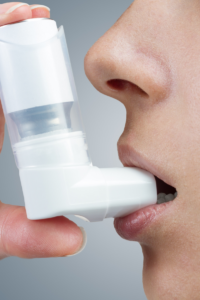Effects of Asthma Medications on Your Teeth

The Effects of Asthma Medications on Your Teeth
Asthma is an inflammatory disease that causes a person to have increased airway responsiveness to specific environmental triggers. The person diagnosed with this disease experiences the following symptoms: dyspnea, chest tightness, coughing, and wheezing. Additionally. the sickness usually starts in childhood, and in most cases the patient has to take inhaled drugs for the rest of their lives. Learn more about the effects of asthma medications on your teeth.
This illness affects more than 300 million people globally. Research shows that the disease decreases as a person ages. The purpose of asthma treatment is to induce bronchodilation and lessen airway inflammation to curb the progression of the disease and control symptoms.
Doctors select treatment based on the seriousness of the disease. The options include: short-acting bronchodilators that are used together with anti-inflammatory drugs, leukotriene modifiers, long acting bronchodilators, and anti-inflammatory agents like CSI. Most of the inhaled medications used to manage this disease have systemic effects.
Studies have shown that ICS is relatively safe at low doses because the severe effects have usually been reported at higher doses. Inhaled corticosteroids affect the eyes, skin, bones, immunity, and hypothalamo-pituitary adrenal (HPA). Inhaled beta2-agonistis systemic effects are hypokalemia, tachycardia, and tremors. These drugs can cause numerous oral diseases, including oral candidiasis, periodontal disease, tooth loss, dental erosion, dental caries, xerostomia, gingivitis, taste changes, and ulceration. These effects on dental health are based on their duration of use, frequency, and dosage.
Oral Diseases That Stress Cause
- Dental Caries: This is an infectious microbiologic sickness of the teeth that causes destruction of the calcified tissues and localized dissolution. Under optimum conditions, saliva covers the tooth. Dental Caries thrive when there is a reduction in the salivary flow in the mouth. Caries are therefore caused by the imbalance between dietary substrate, microflora, tooth, plaque, and saliva over time.
- Xerostomia: Also known as dry mouth, this disease is described as a general decrease in salivary output. This is an effect experienced by patients who use inhaled corticosteroids anticholinergic inhalers and beta-2 agonists. The patients complain of poor retention of artificial dentures; burning sensation; mouth soreness; generalized oral discomfort; altered taste, swallowing, and talking. The disease is clinically represented as epithelial atrophy, ulceration, and oral fissuring.
- Halitosis: Foul breath can be a result of xerostomia and oral infections.
- Oral Mucosal Changes: The use of inhaled corticosteroids causes oropharyngeal candidiasis or oral thrush. Oral thrush (pseudomembranous lesion) looks like white, soft plaques that create a painful ulcerated, eroded, and erythematous surface. The thrush usually attacks lateral aspects of the tongue, oropharynx, and buccal mucosa. Patients experience dysphagia, burning, and tenderness. The use of inhaled corticosteroids can also cause tongue enlargement, dryness of the oral cavity, cough dysphonia, and throat irritation.
- Taste disturbances are due to oral mucosal diseases such as anticholinergics, nedocromil, prophylactic, and candidiasis.
- Ulceration: This is prevalent because of immunosuppression and xerostomia can be caused by inhaled drugs.
- Periodontitis and Gingivitis: The use of inhalers increases the level of gingivitis. The habit of breathing through the mouth that is common in these patients also increases gingivitis because of the alveolar mucosa dehydration. Saliva helps control periodontal disease; therefore, any drug that affects salivary secretion significantly affects this disease’s severity.
Ways You Can Mitigate the Effects of Using Inhalers
- Rinsing your mouth with water after using your inhaler. You can also rinse it using other pH-neutral mouth rinses such as milk and sodium fluoride.
- Use fluoride varnishes and gels (0.4% stannous fluoride, 1% sodium fluoride), pits, and fissure sealants.
- Talk to your dentist and ask them for tips for improving oral health.
- Drink a lot of water to counter the effects of dry mouth.
- Practice dental hygiene.
- Observe a healthy diet by avoiding sugary foods and refined carbohydrates. Eat foods rich in fiber and starch, fruits and vegetables, and use sugar substitutes such as aspartame and xylitol.
- Use inhalers with a spacer device to minimize the medication deposit on the oral cavity.
- Use anti-microbial mouth rinses such as chlorhexidine mouth rinses.
- Get regular oral checkups at least twice a year
- Treat allergies to reduce the likelihood of breathing through your mouth.
- Get a different inhaler. Some medications cause more cavities than others, and some inhalers contain sugar.
If you want to learn more about how asthma affects your oral health, give us a call and talk with one of our experienced team members. Schedule your appointment by dialing(479) 795-1101 or visit our Facebook page. Holman Family Dentistry is ready to prevent your mouth from the effects of inhalers and help you enjoy excellent dental health.